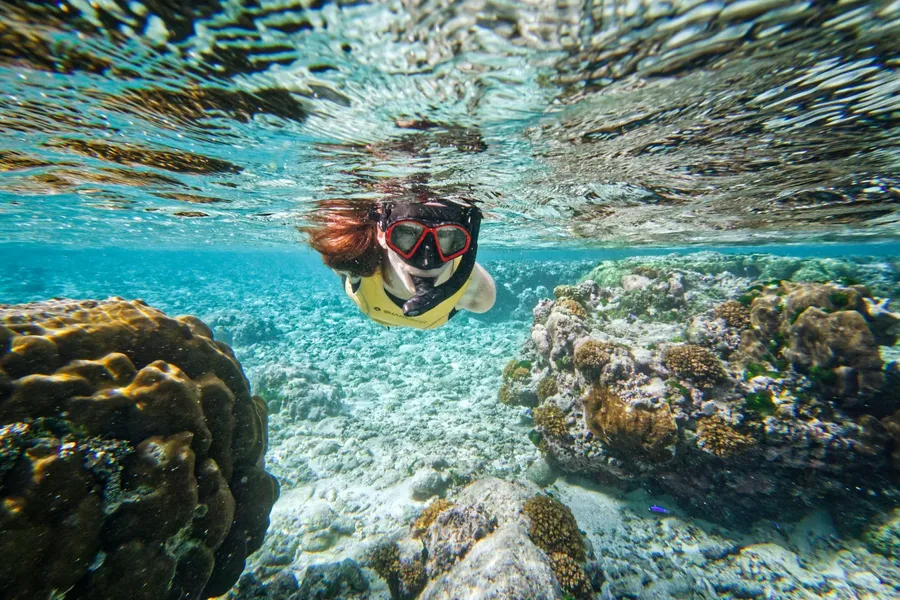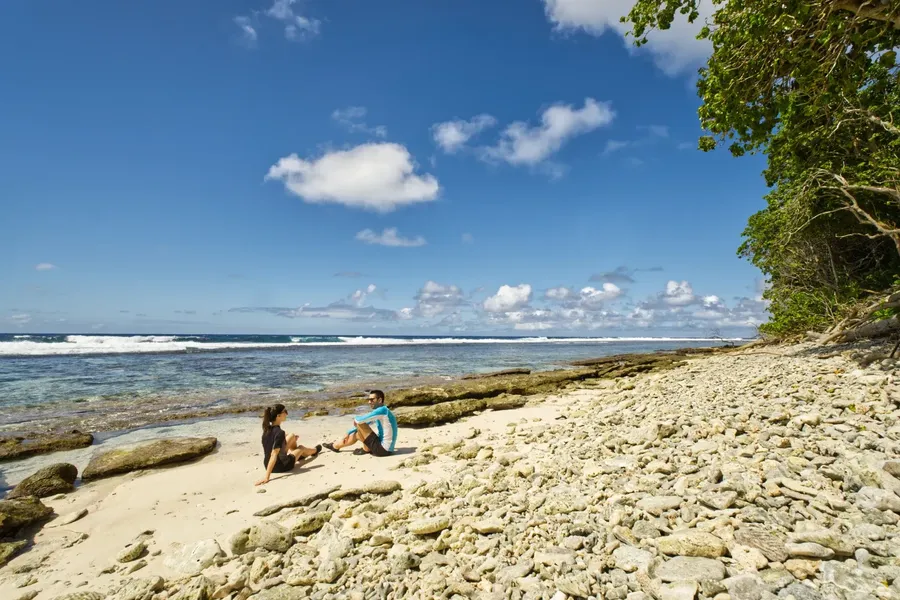What are the Customs in American Samoa?
When welcomed into a new country, it's only fitting to respect the local customs and traditions. As a religious country, American Samoa certainly has some rules when it comes to dressing respectfully, as well as for Sunday behaviour.
On the other hand, some customs and protocols date back thousands of years, which are essential to know when in a village or even when visiting natural attractions.
We go over them all in this guide to Samoa's customs and traditions!
If you were looking for the other type of "customs", head to Arriving in American Samoa: Airport Customs, Biosecurity & Arrival Process...
Table of Contents
10 Dos and Don'ts in American Samoa
- DO seek permission when visiting a beach.
- DO wear respectable clothing in villages and to church.
- DON'T wear skimpy swimwear.
- DON'T wear just your swimmers anywhere other than the beach or swimming pool.
- DON'T swim at village beaches on Sunday.
- DON'T stand if elders are seated.
- DO be patient and accept a slower pace.
- DO ask permission before taking photos.
- DO say "tulou" if passing in front of someone.
- DO respect Sa, an evening curfew in some villages (see below).
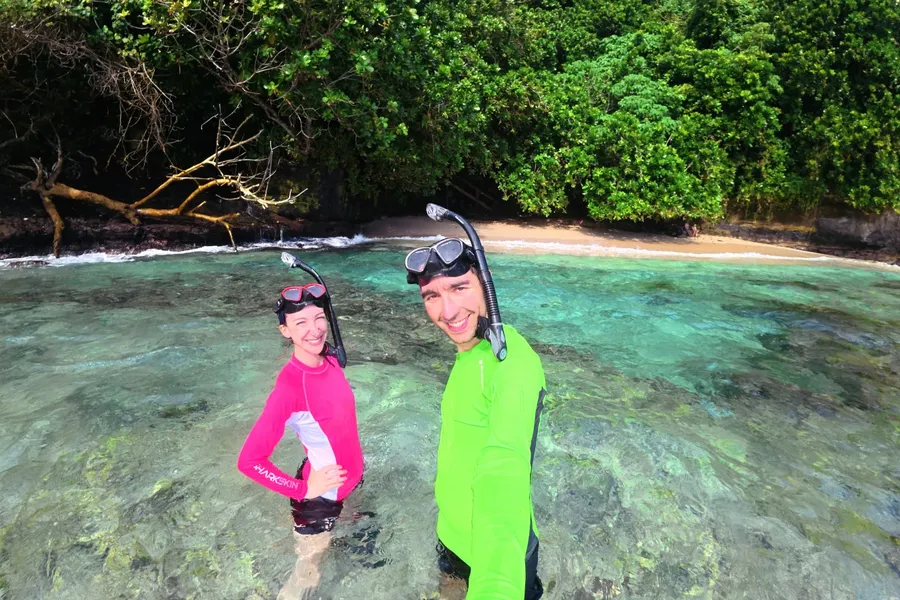
What to Wear in American Samoa
As a deeply religious country, wearing modest clothing is important to Samoans, especially in more traditional settings like villages (which are pretty much everywhere).
A lavalava (sarong) is the most practical and acceptable way to cover up while exploring the islands for both women and men, which are widely available to purchase from markets and gift shops if you haven't already got one.
Otherwise, pants, long skirts, blouses and shirts are all very acceptable. Shorts and T-shirts are also Ok if they are not too short or revealing.
For more tips on what to wear, take a look at What to Pack for American Samoa: American Samoa Packing List.
Swimwear in American Samoa
An important rule for wearing swimwear in American Samoa is that swimwear should stay at the beach or the swimming pool. Additionally, swimwear should not be too revealing. As you may notice, locals swim in shorts/lavalava and T-shirts.
After swimming, ensure you change or cover up your swimwear. When you're exploring local communities or chatting with residents, we recommend slipping on a t-shirt and wrapping yourself in a lavalava.
Taking a moment to cover up or change after your beach time demonstrates genuine respect for the community you're visiting, and locals really appreciate travellers who make this effort.
Needless to say, being nude at the beach (or anywhere in public) is also not acceptable in American Samoa.
What to Wear for Church in American Samoa
When going to a church service, wear respectable and, if possible, formal clothing.
Ideally, men should wear long trousers and a collared shirt, while women should cover their knees and shoulders. Think your "Sunday best"! Also, note that you should not wear flowers to church.
Find out more about church etiquette in the 5 Best Churches in American Samoa for Visitors.
What to Wear at the Pago Pago Golf Course
Another place where you'll find some very mild clothing rules is at the 'Ili'ili Golf Course on Tutuila. It's pretty laidback apart from its customary to wear a collared top. No tank tops. That's it.
Learn more about what to expect at the golf course in The Complete Guide to Golf in American Samoa.
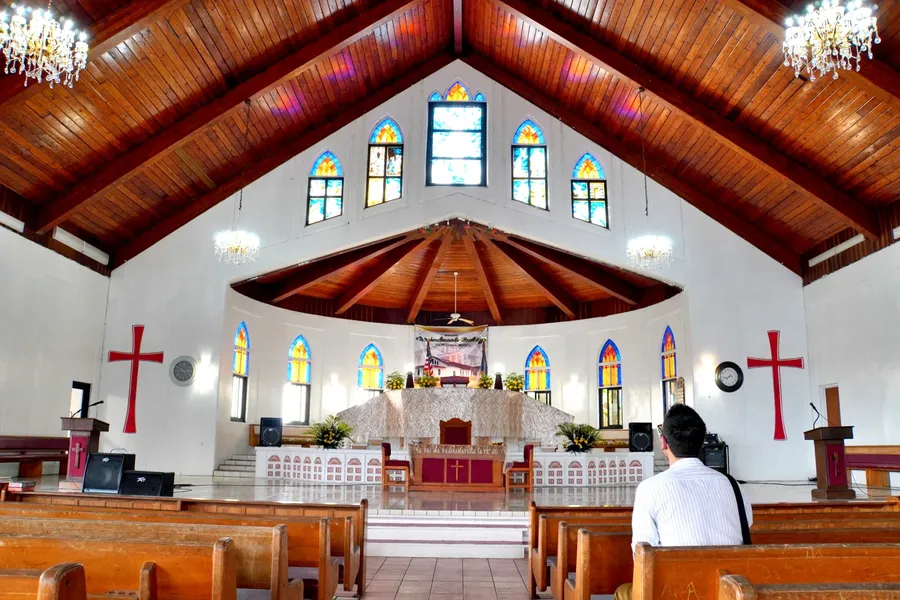
Sunday Rules in American Samoa
American Samoa observes Sunday as a day of worship and rest as per Christian traditions. For this reason, many shops, tours, beaches and businesses may decide to close (though not all), and there are a few protocols to be aware of regarding Sunday in American Samoa.
Sundays in Villages
If you are travelling around American Samoa on a Sunday, you are expected to behave quietly and move slowly through villages.
Apart from the Vatia Trail and Tuafanua Trail, whose trailheads are within Vatia village, the trails in the National Park of American Samoa on Tutuila are open on Sundays. However, you should avoid hiking any trails in the Manu'a Islands on Sunday.
As a general rule, you should avoid swimming on a Sunday, apart from where you have permission. For example, Sadies By The Sea in Fagatogo and Dr Vaasa'a Hideaway in Utumea East (Tutuila) allow their guests to swim at their beach.
While major shops, services and tour operators close on Sunday, some small shops, especially in villages, change their opening hours - either to open then close in the morning before church or open in the afternoon. Some shops even close early on a Saturday.
Visitors are welcome at church services in American Samoa. As mentioned, make sure you dress respectfully by covering your knees and shoulders. For more recommendations on churches to attend, check out the 5 Best Churches in American Samoa to Experience as a Visitor.
Retail outlets and liquor stores (off‑license vendors) cannot sell any alcoholic beverages on Sundays, but hotels and restaurants catering to tourists can.
What Can You Do on a Sunday in American Samoa?
There are still plenty of ways to enjoy yourself on a Sunday in American Samoa. Check out the 10 Things to Do in American Samoa on a Sunday for ideas.

Visiting Beaches: Asking Permission and Paying Your Entry Fees
Possibly one of the most important cultural etiquettes for visitors to understand in American Samoa is that many of the amazing beaches you'll be visiting are not on public land. They are owned by families and communities who are in charge of maintaining these sites. With that, it's required to ask permission before entering, and you may get asked for a small entry fee, which is completely normal and only accepted in cash (USD).
What does this mean in practice? When entering a village with the intention of swimming at the beach, look out for locals to talk to to ask permission. In short, acknowledge the villagers you encounter and be polite.
American Samoa Beach Fees
Entry fees for American Samoa's attractions range from US$5 to $10 per person; children sometimes go free.
Where You Don't Need to Pay Entry Fees
In the case when attractions are on government-managed land, entry fees are not permitted. For instance, the beaches of the National Park of American Samoa are free, as are various government reserves throughout the territory.
See free attractions stated in the 40 Free & Cheap Things to Do in American Samoa.
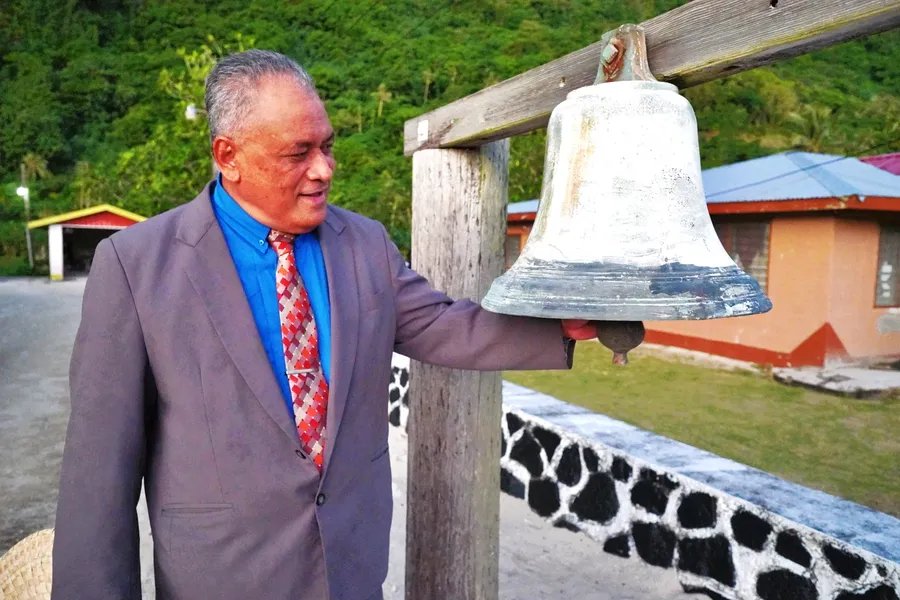
Village Rules in American Samoa
Villages make up most of the settlements across American Samoa. It's highly likely that you'll visit or pass through a village during your trip, so bear some cultural rules of etiquette in mind when visiting a Samoan village:
- Wear modest clothing
- Always ask permission when taking photos
- Ask permission (and pay the entry fee if required) to visit the beaches
- Stop what you're doing during "Sa" (see below)
- Move slowly and quietly through villages on Sunday
- Don't eat while walking
- Don't pick fruit from trees without permission
- Avoid losing your temper or raising your voice; it is uncommon for people to overtly express emotion in front of strangers.
There are also additional rules for visiting a Samoan home, which we go through in the "Rules in the Home in American Samoa" section below.
Sa: Evening Village Curfew
In many villages, an evening curfew is observed for prayer, known as Sa (sacred).
A bell (or old oxygen tank) will sound at the beginning of the curfew, which usually begins between 5 and 6:30 pm. Typically, the first bell will ring as a warning, then the next bell will initiate the start of the curfew.
During this time, you're expected to stop what you are doing (no walking or driving). If you're accommodation is nearby, go back to your accommodation. If not, find somewhere to sit away from the road. Sa lasts for approximately 10-20 minutes.
You'll know when Sa has ended and when you can go about your business after the third bell or conch shell has sounded.
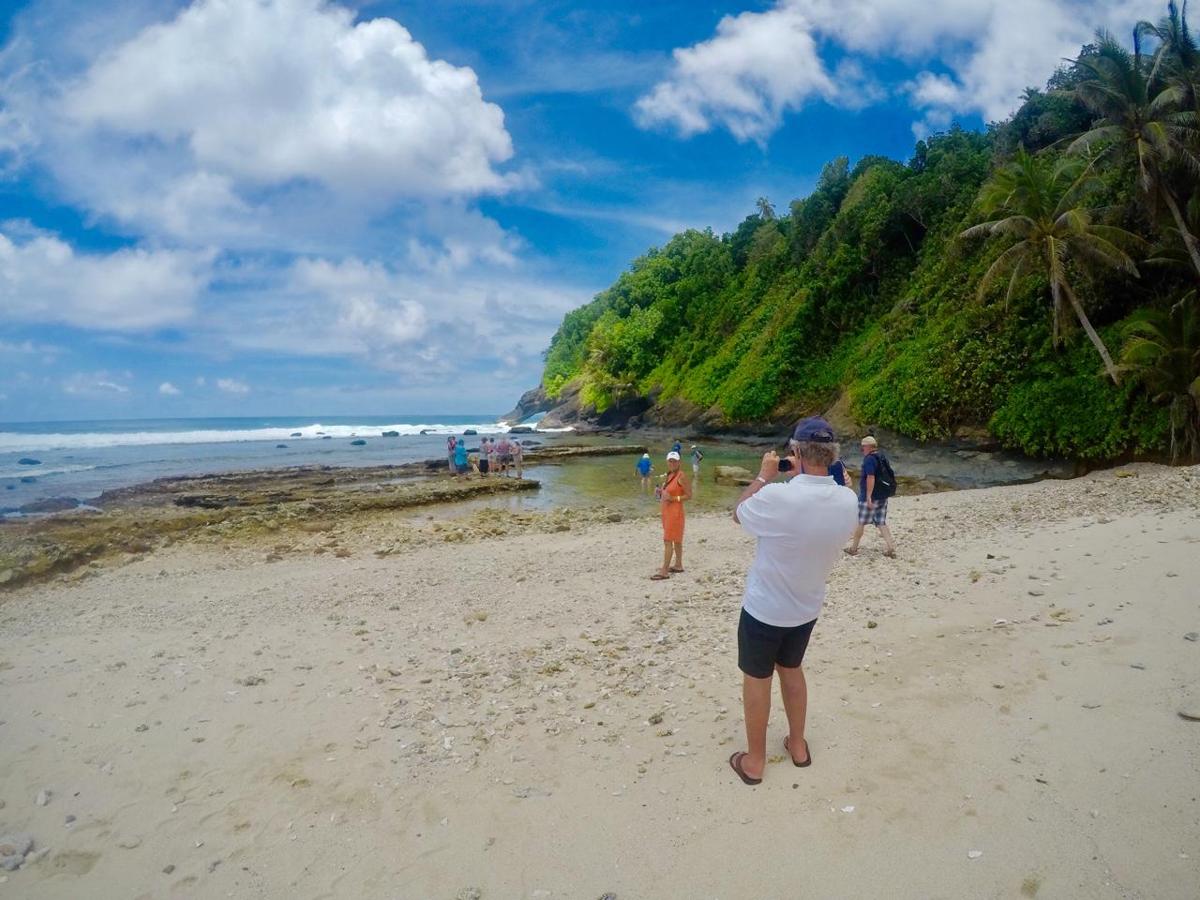
Editor's Choice
Best Tours
Escape to pristine Aunu'u Island, a National Natural Monument where untouched natural beauty meets rich Samoan culture. We'll take you on a scenic boat ride to explore legendary taro plantations,...
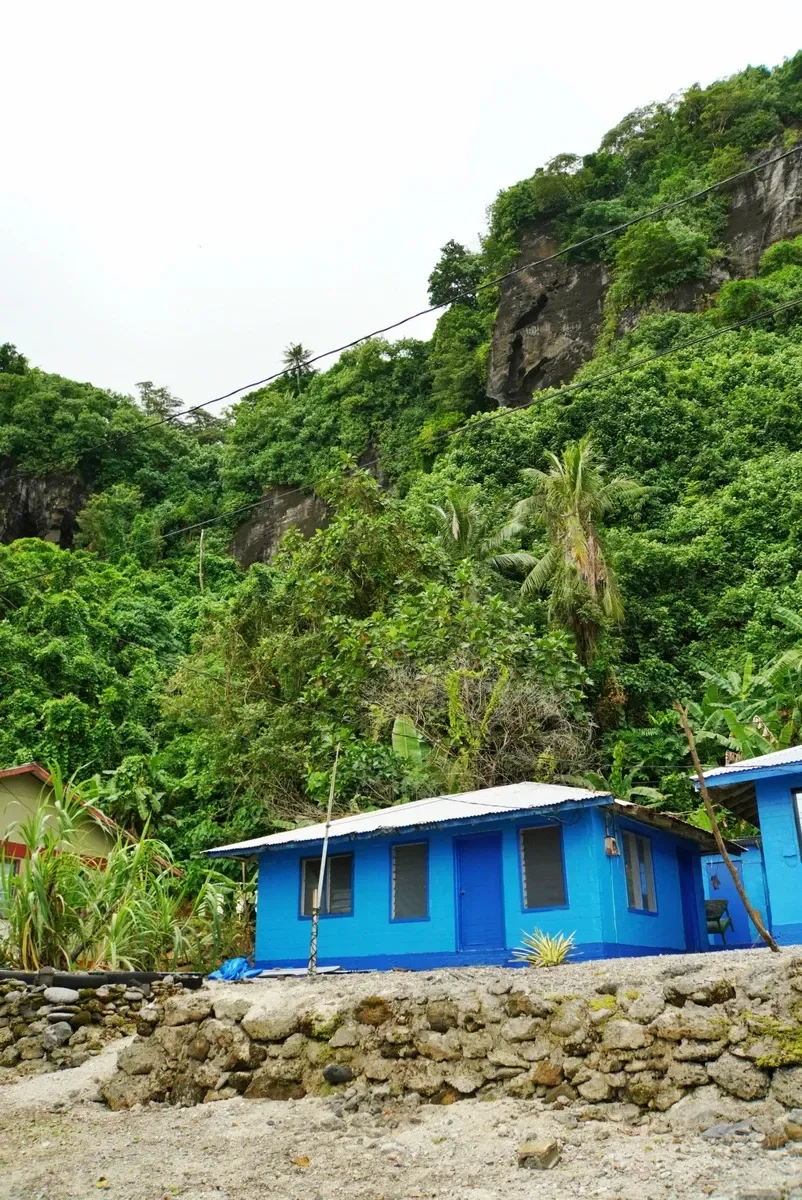
Rules in the Home in American Samoa
If you're lucky enough to visit a Samoan home, there are a few more rules of etiquette to observe:
- Remove your shoes before entering a fale (home).
- Don't stand if elders are seated.
- Allow your host to seat you.
- When sitting, avoid pointing your toes at others by crossing your legs, folding them beneath you, or covering them with a mat or lavalava.
- You should always talk to someone at eye level or lower; if an elder is seated, sit down with them.
- Excuse yourself by saying "tulou" (excuse me) and perform a small bow if your movement obstructs someone's view.
- When handed a cup of 'ava (kava), take a sip and say "manuia".
- Join in on prayers said before meals by bowing your head.
- Don't begin eating until prompted to do so.
More About American Samoan Customs and Traditions
That's it for our guide to American Samoan etiquette and how to respect American Samoa's customs and traditions. For more advice regarding the local culture, check out the following guides:
- The Guide to the Religions in American Samoa
- A Traveller's Guide to the American Samoan Culture
- 10 Best Cultural Activities in American Samoa
Finally, for all your other essential travel tips for the islands, head to The Best American Samoa Travel Guide and 30 Tips for Travelling in American Samoa.


%20CREDIT%20AmericanSamoaPocketGuide.com.webp?v=2025-08-25T04%3A00%3A32.682Z)

